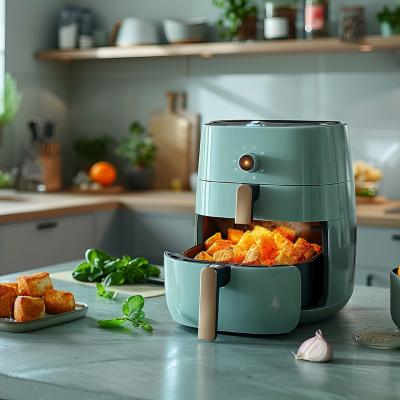
Vegetable oil is made up of over 90% vegetable fat. Vegetable oils are also known as refined vegetable and seed oils, as they have been removed from the original vegetable matter.
Is vegetable oil good for cooking?
"Vegetable oils generally seem to be healthy sources of fat, highly available,
and cheaper in price. Some nutritionists are also concerned about the high amounts of polyunsaturated omega-6 fats
found in certain vegetable oils."
In this blog post, we will take a look at the benefits and drawbacks of vegetable oil and help you decide if it is the right choice for you.
Various Types of Vegetable Oils For Cooking
There are many vegetable oils that you can use for cooking. Some of them include:
Coconut Oil
It is a vegetable oil that comes from the fruit of the palm tree. It has been used in Asia and South America for centuries, but it became popular in other parts of the world only recently.
Olive Oil
This is a vegetable oil that comes from olives. It has been used since ancient times, and it is popular in a variety of cultures.
Soybean Oil
Soybean oil is a vegetable oil that comes from soybeans. It is the most common vegetable oil in North America, as it can be found in almost any grocery store or supermarket.
Corn Oil
It is a vegetable oil that comes from corn. Although it is not as popular as some other vegetable oils, it can be found in many grocery stores and supermarkets.
LEARN MORE: Peanut Oil Vs Corn Oil
Canola Oil
It is a vegetable oil that comes from rapeseeds. It was invented in Canada and has become one of the most popular vegetable oils in North America over the last several decades.
Erucic acid is absent, as opposed to colza oil. The seed of any of a variety of cultivars in the Brassicaceae family can be used to make both edible and industrial forms.
LEARN MORE: Can You Mix Peanut Oil and Canola Oil?
Sunflower Oil
It is a liquid wax extracted from sunflower seeds (Helianthus annuus). It’s commonly used as a frying oil and an emollient in cosmetics.
It is primarily made up of linoleic acid, a polyunsaturated fat, and oleic acid, a monounsaturated fat. Different proportions of fatty acids are created by selective breeding and production techniques.
Palm Oil
It is a vegetable oil that comes from palm trees. It is popular in a number of countries, and it has a mild flavor that many people enjoy.
Mustard Oil
It is a pungent essential oil also known as volatile oil of mustard, or the pressed oil used for cooking. The essential oil is derived from the grinding of mustard seed, which is then combined with water and vaporized using distillation. It might also be produced via dry distillation of the seed.
Avocado Oil
It is a vegetable oil produced from the avocado fruit. It’s a popular cooking oil since it has a mild flavor and high smoke point, but you may also consume it raw.
Avocado oil is comparable to olive oil in terms of usefulness and nutritional value. Cold-pressed avocado oil, like extra virgin olive oil, is unrefined and retains some of the fruit’s flavor and color, making it greenish in color.
Cottonseed Oil
It is a type of vegetable oil produced from cotton plant seeds, particularly Gossypium hirsutum and Gossypium herbaceum.
Cottonseed oil is an excellent choice for salad oils, mayonnaises, and other similar products because it has good flavor consistency.
Peanut Oil
Peanut oil is also known as groundnut oil or Arachis oil, is a vegetable oil derived from peanuts. The flavor of peanut oil is usually mild or neutral, but it becomes stronger if produced with roasted peanuts.
It’s commonly used in American, Chinese, Indian, African, and Southeast Asian cooking for both everyday cooking and to enhance taste in roasted oils.
LEARN MORE: Roasted Peanut Oil Vs Peanut Oil
Almond Oil
This oil is extracted from the dried kernel of almonds. Sweet almond oil is a carrier oil in aromatherapy and cosmetics, while bitter almond oil, which contains benzaldehyde, is utilized as a food flavoring and in perfume.
Sesame Oil
This is a type of vegetable oil derived from sesame seeds that are used in foods. One of the first known crop-based oils, it was produced as far back as 3500 B.C. The oil comes from raw seeds and may or may not be cold-pressed.
The flavor and aroma of toasted seeds oil come from toasting it, but it’s not suitable for frying since it tastes burnt and bitter.
LEARN MORE: Can You Mix Bacon Grease And Vegetable Oil?
Advantages And Disadvantages Of Cooking With Vegetable Oil
Now that we have looked at some different vegetable oils, let’s take a look at the pros and cons of using vegetable oil for cooking.
Advantages
- Vegetable oils are generally healthy sources of fat.
- They are highly available and cheaper in price than other oils.
- Some nutritionists are concerned about the high amounts of polyunsaturated omega-six fats found in vegetable oils.
Disadvantages
- Some nutritionists are concerned about the high amounts of polyunsaturated omega-six fats found in vegetable oils.
- They are not as flavorful as some other oils.
- They can be used for cooking at high temperatures without burning.
LEARN MORE: Can You Use Peanut Oil Instead Of Vegetable Oil?
Advantages And Disadvantages Of Cooking With Other Oils
Now that we have looked at vegetable oil, let’s take a look at the pros and cons of using other oils for cooking.
Advantages
- Other oils are generally healthier sources of fat than vegetable oils.
- They are typically more flavorful than vegetable oils.
Disadvantages
- Other oils are generally healthier sources of fat than vegetable oils, but they tend to cost more money and may not be as available as vegetable oils.
- They are not as versatile as vegetable oils and cannot be used for cooking at high temperatures without burning.
- They may also be more expensive than vegetable oils.
Uses Of Vegetable Oil In Cooking
All of the vegetable oils we looked at are good choices for salad dressings, mayonnaise, and other similar products. Some of these oils, like olive oil and avocado oil, are also good for raw consumption.
Peanut oil is a popular choice for cooking in the United States, India, Africa, and Southeast Asia.
Almond oil is commonly used as a carrier oil in aromatherapy and cosmetics. Sesame oil has been used as cooking oil for thousands of years and has a unique flavor that some people enjoy.
Overall, vegetable oil is a good choice for cooking, but it is important to weigh the pros and cons, your dietary preferences, and the types of foods that you like to cook before making a decision. Other oils are generally healthier than vegetable oils, but they may not be as available or as flavorful.
Conclusion
Some people believe that vegetable oils are healthier than other oils, while others think that other oils are more flavorful. What matters most is what you prefer and what works best for your cooking needs.
It is important to choose the oil that is right for you. If vegetable oil isn’t right for you, then there are many other healthy options that can be used instead of vegetable oils.



